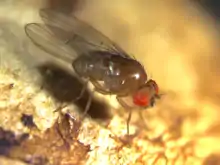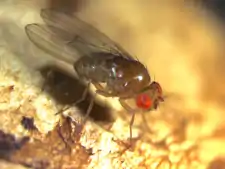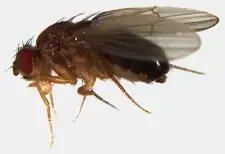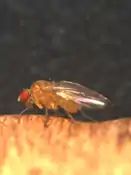| 'Immigrans-tripunctata radiation | |
|---|---|
 | |
| Drosophila innubila of the Drosophila quinaria species group | |
| Scientific classification | |
| Kingdom: | |
| Phylum: | |
| Class: | |
| Order: | |
| Family: | |
| Subfamily: | |
| Genus: | |
| Subgenus: | |
| Species groups | |
| |
The immigrans-tripunctata radiation is a speciose lineage of Drosophila flies, including over 300 species.[1] The immigrans-tripunctata radiation is a sister lineage to most other members of the subgenus Drosophila.[2] A number of species have had their genomes or transcriptomes sequenced for evolutionary studies using Drosophila.
Species groups
The following species groups and numbers largely derive from O'Grady (2018).[2]
- Immigrans species group (106 species)[2]
- Tripunctata species group (83 species)[2]
- Quinaria species group (35 species)[1][2]
- Guarani species group (24 species)[3][4]
- Cardini species group (16 species)[2]
- Calloptera species group (8 species)[2]
- Bizonata species group (7 species)[2]
- Funebris species group (7 species)[2]
- Testacea species group (4 species)[2]
Sequenced genomes or transcriptomes
The following species have extensive genetic sequence data available. [Last updated: 24 August 2019]
Quinaria species group
Immigrans species group
Testacea species group
Gallery
References
- 1 2 Hanson MA, Hamilton PT, Perlman SJ (October 2016). "Immune genes and divergent antimicrobial peptides in flies of the subgenus Drosophila". BMC Evolutionary Biology. 16 (1): 228. doi:10.1186/s12862-016-0805-y. PMC 5078906. PMID 27776480.
- 1 2 3 4 5 6 7 8 9 10 o'Grady, Patrick M.; Desalle, Rob (2018). "Phylogeny of the Genus Drosophila". Genetics. 209 (1): 1–25. doi:10.1534/genetics.117.300583. PMC 5937177. PMID 29716983.
- ↑ Peñafiel-Vinueza, Ana Danitza; Rafael, Violeta (2018). "Five new species of Drosophila guarani group from the Andes of southern Ecuador (Diptera, Drosophilidae)". ZooKeys (781): 141–163. doi:10.3897/zookeys.781.22841. PMC 6160839. PMID 30271239.
- ↑ "FlyBase phylogeny". Retrieved 24 August 2019.
- ↑ Koshikawa, Shigeyuki; Giorgianni, Matt W.; Vaccaro, Kathy; Kassner, Victoria A.; Yoder, John H.; Werner, Thomas; Carroll, Sean B. (2015). "Gain of cis-regulatory activities underlies novel domains of wingless gene expression in Drosophila". Proceedings of the National Academy of Sciences. 112 (24): 7524–9. Bibcode:2015PNAS..112.7524K. doi:10.1073/pnas.1509022112. PMC 4475944. PMID 26034272.
- 1 2 3 Hill, T.; Koseva, B. S.; Unckless, R. L. (2019). "genome of Drosophila innubila reveals lineage-specific patterns of selection in immune genes | Molecular Biology and Evolution | Oxford Academic". Molecular Biology and Evolution. 36 (7): 1405–1417. doi:10.1093/molbev/msz059. PMC 6573480. PMID 30865231.
- ↑ Zhou, Qi; Zhu, Hong-mei; Huang, Quan-fei; Xuan, Zhao-lin; Zhang, Guo-jie; Zhao, Li; Ding, Yun; Roy, Scott; Vicoso, Beatriz; Ruan, Jue; Zhang, Yue; Zhao, Ruo-Ping; Mu, Bo; Min, Jiu-Meng; Zhang, Qing-hui; Li, Jian-wen; Luo, Yin-Ling; Liang, Zu-Heng; Ye, Chen; Li, Rui-Qiang; Zhang, Xiu-Qing; Wang, Jun; Wang, Wen; Bachtrog, Doris (2012). "Deciphering neo-sex and B chromosome evolution by the draft genome of Drosophila albomicans". BMC Genomics. 13: 109. doi:10.1186/1471-2164-13-109. PMC 3353239. PMID 22439699.
- ↑ Vicoso, Beatriz; Bachtrog, Doris (2015). "Numerous Transitions of Sex Chromosomes in Diptera". PLOS Biology. 13 (4): e1002078. doi:10.1371/journal.pbio.1002078. PMC 4400102. PMID 25879221.
- ↑ Hamilton, P. T.; Leong, J. S.; Koop, B. F.; Perlman, S. J. (2014). "Transcriptional responses in a Drosophila defensive symbiosis - Hamilton - 2014 - Molecular Ecology". Molecular Ecology. 23 (6): 1558–70. doi:10.1111/mec.12603. PMID 24274471. S2CID 2964885.
This article is issued from Wikipedia. The text is licensed under Creative Commons - Attribution - Sharealike. Additional terms may apply for the media files.
.jpg.webp)


